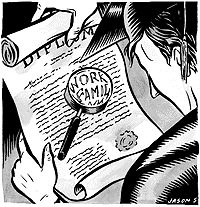A Revolutionary Letter on Education II
By Michael Ventura, Fri., Nov. 7, 1997
|
|
I don't mean "history" as it's now taught: a linear timeline of safe opinions about who was elected and what wars were fought. The young rightly feel that this has little to do with them. My kid went to a touted "magnet" high school. His history text covered both the Korean and Vietnam wars in one sentence -- a sentence saying that America did, indeed, fight wars in countries called Korea and Vietnam. And that was it. How could he possibly think this was worth learning? What was there in that sentence to learn? He felt, inarticulately but strongly, not that he was learning, but that learning was being kept from him. And he was right. It became hard to argue with his intuition not to trust his educators.
Teachers who accept such sentences in their texts can't be said to have integrity. And there is nothing a child spots faster, or despises more deeply, than a failure of integrity.
What map can be given the young to make them more prepared for, and less afraid of, the present? The answer begins with another question: What areas of life can we be sure these young people will have to deal with day to day, for the rest of their lives? The answer is obvious: They will have to deal with the chaos of our present state of marriage and "relationships," and they'll have to go to work.
A core curriculum must begin at the core. Work and relationships are the core of life -- the issues that youth cannot help but face as soon as they are of age. There is no way for students to feel that these things have nothing to do with them, for these subjects constitute the root of their anxieties and the key to their survival.
The workplace and the arena of relationships are, today, chaotic. That's terribly frightening and confusing, especially to the young. The stats on drugs, violence, and teen pregnancy demonstrate how frightening. But this chaos didn't happen overnight. It has a history -- which is to say, people not unlike ourselves brought us to this place. Knowing how that happened could lessen confusion, and so lessen fear.
This requires instruction that answers basic questions. Questions like: What did "family" mean in the tribes and villages of our ancestors? What was the function of family then -- did people marry for romance or survival? How did people get married? What was the role of romantic love? Is its role different now? How did it become different? Did communities raise their children differently? What work did people do, and how, and why? What were the divisions of labor? Obviously, the answers would involve literature, history, science, technology -- subjects studied for their answers to these questions, not merely as distinct disciplines steeped in jargons that have little to do with each other. Kids would be studying history as it applies to the most personal of choices -- choices very like those they will soon be called upon to make.
Why would such a curriculum have a chance of truly educating? Because it takes the personalization of life that kids are fed in the media -- where everything from E.R. to the White House is seen as revolving around "love" -- and studies whether that vision has any validity, investigating the realities of love and work in our time and in the past. Thus kids would have a means of measuring the vision that the entertainment industry presents everywhere they look. We must see that it is "entertainment," not school, that educates kids these days; and we must give them an antidote.
As for studying the workplace: The map is all around us. We have only to look at it as a map.
How does the workplace actually work? Pick a major building in any city. Pick a specific brick or girder of window in that building. Figure out how it got there. This is no simple task, and could easily take a class of 30 a couple of years. Who decided this building should be built on that space? How did they get permission to build? Where did they get their financing? How did they get into position to do such a thing? What accommodations did the city have to make? What zoning laws, what taxes? Who voted for what, in city government, and why? Who designed the building, and how? How was the brick or girder or window made, and where, and how did those people get those jobs, and what were their skills, and how was that work organized? What did the construction process consist of? What were the direct and supportive jobs necessary, and how did people get those jobs? What skills were necessary, job by job? For which offenses were people fired? What does a CEO do? A board of directors? A crew chief? A supervisor? A secretary? What are their qualifications? What are their salaries? What are their benefits? What are their complaints? What genders and races do which jobs? Why?
Answer such specific, concrete, basic questions about a specific object in a specific place in their hometown, and you give the young what they most need: an accurate map of their environment. A map that includes politics, history, economics, psychology, gender, race, labor relations -- in a word: life. Such a map doesn't depend upon anybody's doctrine, for it exists right in front of us and can be compiled by asking questions of real people and by looking into public records. You would graduate a high school class with a reasonable basis upon which to make choices -- young people whose studies have given them a working knowledge of, and hence a deeper connection to, their home ground.
Almost any viewpoint will do for a starting place, so long as any question is tolerated and no facts are held back. For what we've forgotten is that the point of an education is to ask and answer questions that matter. Questions that have to do with creating a functional map of the world. Questions that have to do with survival.
Most youth now view education, from kindergarten to graduate school, as a pointless and expensive pain in the ass. Ideally, you get your masters degree -- then look for a job. Our degreed graduates are in their mid-twenties before they begin to experience an accurate map of the larger world; it is no wonder many feel like adolescents well into their thirties. And all the while they're also looking for, or dealing with, a mate! The job and mate are questions of economic and psychic survival. And exactly because they are questions of survival, they are the questions with which education should concern itself first, and not wait until after graduate school. For education is still a tribal imperative: teach the young to survive, to carry on. Today's high school curriculum gives this lip service, but not a serious attempt.
Yes, I am outlining a revolution in the way education is conceived and taught -- revolution in the grouping of subjects, and in returning "study" to its essential function as investigation. But revolutions in education have happened before, when a changing world has made the previous mode of education obsolete. Such a change is upon us now, and what we call "education" has become increasingly obsolete. Every year we graduate hundreds of thousands of dazed children in adult bodies, many of whom can barely speak or write the language. These people are not equipped to inherit a world. Without a revolution in education, their children will be even less equipped.
There is nowhere to start but at the beginning, rethinking everything. Education is, and always has been, about survival. Unless we remember and re-emphasize this fact, we fail as educators, as elders, as civilized people whose primary task is to pass their civilization intact to children capable of improving upon it.









